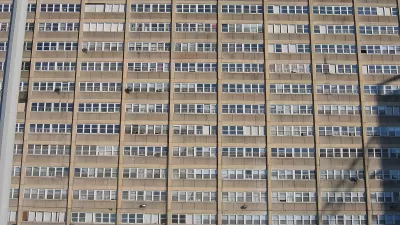The Chicago Tribune examines what became of an ambitious city project, led by Mayor Daley, to revolutionize public housing. Private developers received public funding to tear down old projects and replace them with mixed-use neighborhoods.
"Conceived amid a rising housing market, the city's Plan for Transformation used hundreds of millions in taxpayer dollars and virtual giveaways of public land to reverse decades of neglect that confined the city's poorest residents to racially segregated ghettos.
Demolition of Chicago's reviled high-rises became a national symbol of change and hope, but little attention has been focused on what happened next as rhetoric collided with realities.
A Tribune investigation found that almost nine years into what was billed as a 10-year program, the city has completed only 30 percent of the plan's most ambitious element-tearing down entire housing projects and replacing them with new neighborhoods where poor, working-class and wealthier families would live side by side.
In fact, of those public housing units that have been built, nearly half went up before the plan officially started in 2000.
The consequences of these failures go far beyond Chicago. The federal government also prodded dozens of cities across the country to adopt similar blueprints for fixing their public housing sites. Since then, many of those projects have stalled as well."
FULL STORY: Public housing limbo

Planetizen Federal Action Tracker
A weekly monitor of how Trump’s orders and actions are impacting planners and planning in America.

Chicago’s Ghost Rails
Just beneath the surface of the modern city lie the remnants of its expansive early 20th-century streetcar system.

San Antonio and Austin are Fusing Into one Massive Megaregion
The region spanning the two central Texas cities is growing fast, posing challenges for local infrastructure and water supplies.

Since Zion's Shuttles Went Electric “The Smog is Gone”
Visitors to Zion National Park can enjoy the canyon via the nation’s first fully electric park shuttle system.

Trump Distributing DOT Safety Funds at 1/10 Rate of Biden
Funds for Safe Streets and other transportation safety and equity programs are being held up by administrative reviews and conflicts with the Trump administration’s priorities.

German Cities Subsidize Taxis for Women Amid Wave of Violence
Free or low-cost taxi rides can help women navigate cities more safely, but critics say the programs don't address the root causes of violence against women.
Urban Design for Planners 1: Software Tools
This six-course series explores essential urban design concepts using open source software and equips planners with the tools they need to participate fully in the urban design process.
Planning for Universal Design
Learn the tools for implementing Universal Design in planning regulations.
planning NEXT
Appalachian Highlands Housing Partners
Mpact (founded as Rail~Volution)
City of Camden Redevelopment Agency
City of Astoria
City of Portland
City of Laramie



























